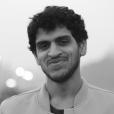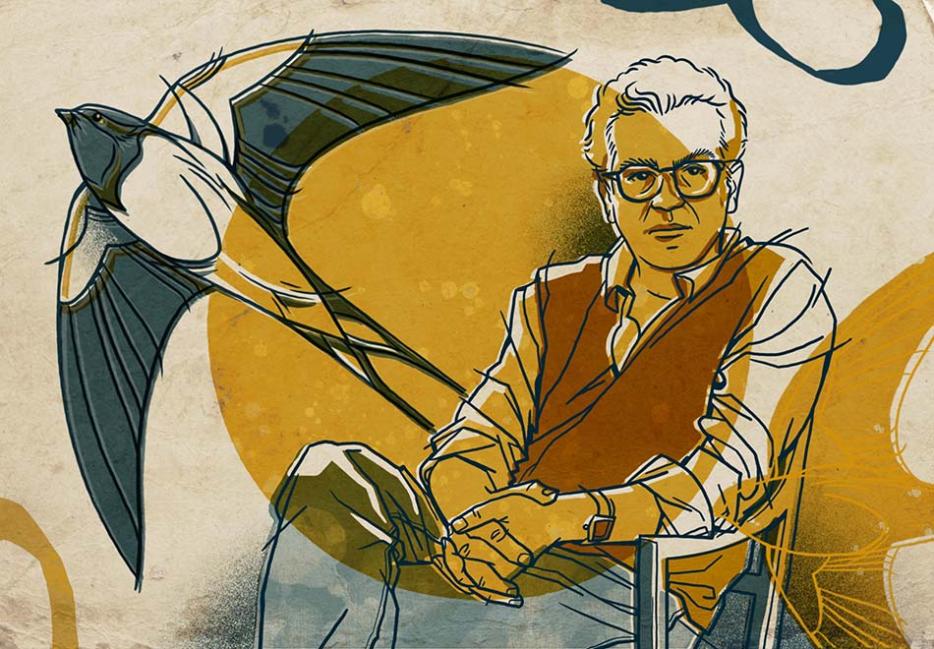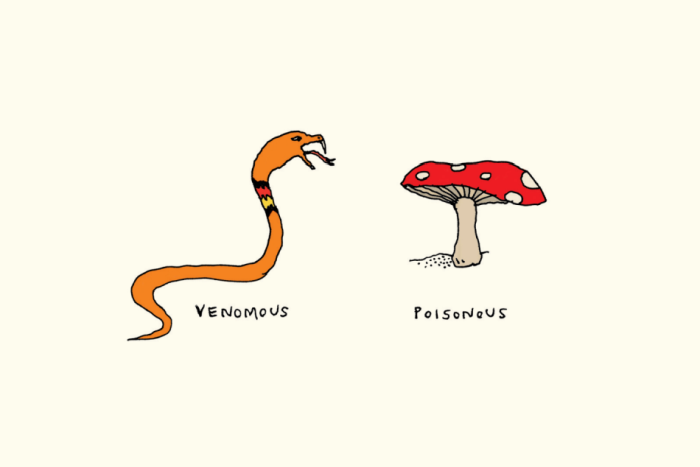The world ended for Hisham Matar when he was nineteen. In March 1990, his father Jaballa Matar, a Libyan dissident in exile, was kidnapped from their family apartment in Cairo. At the time Hisham and his older brother were both college students in London. When they flew home their mother told him that their father was handcuffed, blindfolded, and whisked away in a car by Egyptian secret agents, but two years later, a furtively-written letter from Jaballa would reveal that the Egyptians had actually delivered him to the Libyan police. He was taken across the border to the Abu Salim prison in Tripoli, also known as “The Last Stop” during Muammar Qaddafi’s forty-year reign. Nobody knows what happened to Jaballa after the mid-nineties.
Matar’s mother calls her husband the Absent-Present, suggestive of the enduring uncertainty about his fate. But that moniker could just as well describe her son’s strange, angular body of work, studded with sentences that feel both watchful and intimate.
I came to Hisham Matar late, in my mid-twenties, inside a sleepy, sunless apartment in New Delhi. I still recall the shadowy room, with the windows permanently replaced by an air-conditioner, where I finished reading The Return, his Pulitzer Prize-winning memoir of travelling back to Libya after three decades. Among the first things Matar notices, shortly after landing in Tripoli, is how the houses he remembers from his childhood have changed:
Light is no longer welcome in the houses. It is shut out, like other things, that come from outdoors: dust, heat and bad news. Architecture, the physical representation of considered gestures, has changed in the years I have been away. It has turned its back on nature. When I was a boy, gardens had low fences or no fences at all and, outside the high sun hours, windows would be left open. Now high brick walls keep out the view and windows are almost permanently shuttered. I could not help but read, in this new determination to keep out the sun and the passing gaze, an inner upheaval, a private disquiet.
The first time I encountered this passage I thought of a fragment from Alfred Tennyson’s poem, “The Lotos-eaters”: “Give us long rest or death, dark death, or dreamful ease.” Faced with the grim possibility of his father’s death in captivity under Qaddafi’s reign, Matar was fashioning the truth of his experience with dreamful ease. In a style at once hard-won and fluid, Matar was willing to let his imagination shape the twin absences in his lives—his father, the defiant guide, who appeared to still have his spirit intact in one of the three letters he managed to smuggle out from prison, “The cruelty is in everything, but I remain stronger than their tactics of oppression…My forehead does not know how to bow”; and the Libyan landscape that Matar had last glimpsed as an eight-year-old and was now seeing again with adult eyes.
I just had to glance around my room to grasp the disquiet he’d intuited in the transforming architecture of the houses in his homeland: the high brick walls and shuttered windows were no doubt reflective of the cruelties that Qaddafi and his fanatical “revolutionary committees” unleashed on longsuffering Libyans. In India, we were living through Narendra Modi’s first term as prime minister. Walking around the smoky cities and towns in the northern half of the country, you now noticed that our windows too were no longer left open. Every other morning you’d wake up and learn that your currency notes had been withdrawn from circulation overnight, or a fellow citizen brutally lynched in public, or a dissenting intellectual assassinated while strolling around their neighbourhood. Matar had written about similar upheavals becoming a feature of daily life in Libya, not long after Qaddafi first seized power in a bloodless coup in 1969.
Decades later, under a different illiberal regime halfway around the world, I was living inside a Matar novel.
*
Matar was born in New York, a year after Qaddafi’s coup. Jaballa and his wife had moved to Manhattan some months before, when he was posted with the Libyan delegation to the United Nations. The family moved back to Tripoli in 1973, eventually settling in a locality to the west of the city. By then, the revolutionary committees were out in full force, burning books and executing critics of the regime in public squares. Jaballa set up a lucrative business, importing Japanese and Western goods, but his innate refusal to compromise—his father, Hamed Matar, had once fought in the resistance against the Italians—made him a popular opposition figure. In 1979, Hisham escaped with his mother and brother to Nairobi; Jaballa followed them soon after and the Matars eventually set up a home in exile in Cairo.
At fifteen Hisham moved to London for his schooling and he has mostly been based in that city since. (He teaches a semester every year at Barnard College in New York.) Khaled, the narrator of his latest novel My Friends, is also an exiled Libyan living in London. For decades, he has shared the “invisible burden” of estrangement with two fellow countrymen—Mustafa, a quick-tempered real estate agent, and Hosam, a brooding writer. Most Fridays they meet up at a French bistro on Holland Park Avenue, and regale one another with tales of the homeland, or follow up ghastly assassinations of Arab writers and activists in London over the years. “London is a bottomless well,” Hosam tells his friends once. “A city of blood and fire.” When the Arab Spring comes to Libya in 2011, Mustafa is the first to go back and join the rebels fighting the Qaddafi regime: “We have a real chance now,” he declares. Hosam travels to Benghazi, ostensibly to check up on his ailing father, and also ends up joining the revolution. Khaled decides to stay put in London, to carry on living in his rented studio flat in Shepherd’s Bush, despite his parents’ tearful phone calls from home.
What explains the three friends’ different decisions? For one, their lives in London are wrought by a common trauma. In 1984, they were among the students who had gathered outside the Libyan embassy in St. James Square to protest the relentless atrocities back home. Libyan officials had fired a machine gun at the crowd from inside the embassy, killing one British police officer and injuring several protesters. Britain and Libya suspended their consular ties for years after the incident. Khaled and Mustafa were among the ones shot, but Hosam, then famous for his satirical short stories, managed to escape. Decades later, faced with the prospect of joining another protest thousands of miles away, they can’t help but recall their shared wound.
Just as Khaled and his friends struggle under the weight of their past lives, My Friends is also haunted by the ghosts of Matar’s early work. His first two novels—In the Country of Men (2006) and Anatomy of a Disappearance (2010)—are inflected by a persistent phantom absence. They are both narrated by sons whose fathers are abducted halfway through, and the sons are in due course sent to a school abroad: father and son both end up, in disparate ways, far from home. But beyond the facile biographical correspondences with Matar, the two narrators are linked by their friendless inner lives. They are both only children, unable to relate to other kids in their neighbourhood or their classmates at school in the wake of an authoritarian crackdown on their families. They might register the smell of alcohol on a parent’s breath, or the conspiratorial way their father leans into them at a restaurant and tells them to never frequent the same places or leave their food unattended anywhere, but they can’t exactly share these details with anyone else. Matar excels at tracking the emotional tempests of children exposed too soon to the vulnerabilities of adults around them, how they end up becoming more attentive and secretive. Their awareness of what distinguishes them from others is precisely their tragedy: they are marked out by the sense of reserve with which they must learn to see the world.
Matar’s sophomore novel is his starkest and most stylish. Nuri, our precocious protagonist, hits the ground running; he doesn’t waste time on introductory niceties. “My father disappeared in 1972, at the beginning of my Christmas holiday, when I was fourteen”: there it is, the missing father on the opening page.
Twelve-year-old Nuri lives with his father Kemal Pasha, a leftist dissident banished from an unnamed country, in a listless family apartment in Cairo. Nuri lost his mother some time ago—recalling the visitors at her funeral he writes, “I have never seen our house so full yet so quiet.” On a summer holiday in Alexandria, father and son both fall for Mona, a twentysomething British woman who speaks fluent Arabic, but only Pasha gets to marry her. Soon after Mona moves into the Cairo apartment, Pasha insists on enrolling Nuri at a boarding school in England. Away from home, Nuri doesn’t yearn for his father—or the family apartment—as much as for Mona: “She occupied my thoughts entirely…Is the heart always failing itself or by nature unfaithful?”
The story picks up pace after Pasha’s disappearance under mysterious circumstances from an apartment in Geneva. Nuri and Mona are a train ride away, waiting for him to join them at a hotel in Montreux, when they read about the kidnapping in a local newspaper. Printed alongside the report is a monochrome photograph of a woman: one Beatrice Benameur, the owner of the Geneva apartment, and apparently the person Pasha was living with when he was whisked away. Who is Beatrice and how did Pasha end up in her apartment? Meanwhile, in Pasha’s native country, the government declares that “he has, of his own volition, returned to the capital,” although he is nowhere to be seen or found. Nuri is forced to reckon with “all that I did not know about my father.” Back inside the family apartment in Cairo, he wishes Pasha were seated at the dining table again.
For a novel so propelled by suspense, it is impressive how every chapter is drenched with longing. There is Mona, at once a crush and a confidant. The first time Nuri meets her in Alexandria, the strap of her dress reminds him of “the yellow hospital bracelet that had been bound round my mother’s wrist.” After Pasha’s kidnapping, she becomes the parental substitute he can lash out at for years. The adult Nuri’s cruelty towards Mona is matched only by the intensity of his teenage feelings. Then there is Naima, who might be more than just a housemaid who has always worked for Nuri’s family. But above all, there are the spaces afflicted by the memory of his father: the family apartment in Cairo; the hotel in Alexandria where father and son first met Mona; the apartment in Geneva where he was last seen alive. In his mid-twenties, Nuri revisits these spaces, circling them like points of pilgrimage. He catches up with the people who knew him as his father’s son. All the while, he’d rather run into Pasha again.
Suleiman is nine and wishes that his father, Faraj, were more like his best friend Kareem’s father, Ustath Rashid. The two fathers are good friends, and live on the same street in Tripoli, but to their children they appear to have nothing in common. Ustath Rashid is a gregarious college professor who likes taking his students, and his son, along on day trips to historical ruins. Faraj is wealthier but more withholding in his affections: he might travel the world “looking for beautiful things and animals and trees to bring to our country,” but to his young wife and son, he seems impossibly distant. When Qaddafi’s revolutionary committees come calling, the fathers disappear. The children are playing football one morning when a white unmarked car—like “a giant dead moth in the sun”—pulls up into the neighbourhood. Four men get down, drag Ustath Rashid out of his house, and rough him up in public, before bundling him away in the back seat. Faraj goes underground, anticipating he is next on the committee’s watchlist. By the time the white car shows up again in the neighbourhood, Suleiman’s mother, Najwa, has burned down her husband’s collection of books—Suleiman manages to hide one, titled Democracy Now—and installed a portrait of Qaddafi in the living room.
Despite the refrain of the absent father, Suleiman’s relationship with his mother is the most affecting in the novel. Najwa’s tragedy is twofold: she is burdened by an oppressive regime and an oppressive marriage. At fourteen, she was married off to a man nearly twice her age. Once she even swallowed a “handful of magic pills” that were apparently supposed to ensure she never got pregnant. Ten years on, she is an alcoholic who relapses each time Faraj goes away on a trip. She tries to persuade Suleiman that the bootlegged bottles are her “medicine” and that Scheherazade, in A Thousand and One Nights, “chose slavery over death” when she begged her husband for her life towards the end of the book. When Faraj is targeted, however, Najwa knows who to placate to get her family off the hook. “You can die ten times over,” she warns one of her husband’s fellow dissidents. “It would do no good now.”
What happens to a child growing up amidst the clamour of an autocratic regime? Matar doesn’t need to shock the reader by piling up one horrific scene after another. He mostly stays close to Suleiman and records what he sees and thinks: how withdrawn Kareem becomes, for instance, after the Libyan state television broadcasts a recording of his father’s interrogation by the police; or how Sharief, one of Ustath Rashid’s kidnappers, becomes a friendly figure after he starts hanging around the neighbourhood. And yet Matar also doesn’t look away when he describes a public execution halfway through: Suleiman notices the urine-stained trousers, the crowd egging on the executioners. Years later, he can still recall feeling “a kind of quiet panic, as if at any moment the rug could be pulled from beneath my feet.”
Early in Matar’s 2016 magnum opus, his mother asks him, “Who is returning? Suleiman el-Dewani or Nuri el-Alfi?” It is March 2012, and mother and son are waiting for their flight to Libya at the Cairo airport when Matar is confronted by what he feels is a “mischievous question.” Matar detects a note of concern in his mother’s voice: “What her question, spoken in a tone that was perfectly balanced between seriousness and jest, was really saying was that she would much rather I return with my two fictional characters than be carrying the ghost of my father…”
Readers of Matar’s early novels might ask themselves a similar question as they dive into this memoir: Who is returning? The son or the writer? Matar’s ability to tread carefully between subtlety and naked sentiment is reminiscent of Doris Lessing’s Going Home and V.S. Naipaul’s The Enigma of Arrival: books that don’t flinch away from the ambiguous rift between past and present, the implausibility of ever feeling at home again. Not long after landing in Benghazi, Matar pays a visit to Mahmoud, an uncle who had been incarcerated in the Abu Salim prison together with his father. Mahmoud tells him about the massacre that took place in the summer of 1996 when more than 1,200 inmates were rounded up and shot dead inside the jail compound. Jaballa was moved from his cell a couple of months before the bloodbath. He hasn’t been spotted since:
“But this means they killed him?”
“I don’t know,” Uncle Mahmoud said, “I don’t believe so. I still believe Jaballa is alive.”
“But how could that be?” I said, feeling myself grow impatient. “If he is alive, then where is he?”
“I don’t know,” he said. “All I know is that he’s my brother and I don’t believe he’s dead.”
Shortly after The Return was published in the United States, a review in Harper’s magazine criticized Matar for being “a little in love with the poetry of his family’s suffering. He is unable to lay to rest a loss that cannot be verified.” I remember reading the article and wondering if the reviewer had even read the book from start to finish, particularly the chapters recounting the Matar family’s desperate campaign to obtain the barest of information about Jaballa and other incarcerated relatives, the labyrinthine flashes of faith that prompted Hisham to turn up once at the office of the then-foreign secretary of Britain, David Miliband—“I took note of his exceptionally hairless hands”—and later, to even agree to talk to one of Qaddafi’s sons, Seif al-Islam. There is certainly nothing poetic about holding your peace when the son of your father’s killer coolly gives you the runaround every couple of weeks: “I want you to think of me as a brother and a friend.” “This is complicated, from start to finish.” “Trust me.”
The Return documents more than a son’s Dantean quest for his father; it also succeeds spectacularly as reportage. Matar captures the buoyant interlude after the fall of the Qaddafi regime in 2011, those brief few months when many Libyans expressed “optimism and foreboding in the same breath.” He turns out to be prescient about the private militias that were already plundering oil fields and ports during his trip. The fact that one of his cousins lost his life fighting for the rebels during the uprising doesn’t blind him to the danger posed by the thousands of men who’d procured guns and taken over public buildings and roads in the absence of a state army and police force. Today the country is run by two competing administrations in the east and the west, with elections still an overdue possibility. Last year, two dams collapsed and swept away thousands in the eastern city of Derna. Local warlords cynically manipulated the situation to further entrench their power in the region. I thought of a sentence Matar had written nearly a decade ago: “Revolutions have their own momentum, and once you join the current it is very difficult to escape the rapids.”
Paintings are a recurring motif in Matar’s work. In Anatomy of a Disappearance, little Suleiman and his father are wandering around the National Gallery in London at one point when they chance upon J.M.W. Turner’s Calais Pier. “Your mother would have liked this,” the father wistfully tells his son. In The Return, Matar digs up his diary from 1996, the year his father was last seen by his fellow inmates, and discovers that on the exact date of the massacre in Abu Salim, Matar spent the afternoon at the National Gallery, staring at Édouard Manet’s The Execution of Maximilian, a picture of a man being gunned down by a firing squad.
After he finished writing The Return, Matar spent a few weeks in Siena, walking around its streets and cemeteries, loitering around the medieval-era paintings inside its churches and museums. A Month in Siena is simultaneously a treatise on selected Italian paintings and a journal of his specimen days. Everywhere he goes Matar is guided by a feeling of whimsy, the imaginative freedom he admires most about Sienese art. In a couple of sentences, he can move from a memory of happiness with a childhood friend, to the “curiously tragic, almost regretful” look on David’s face in Caravaggio’s David with the Head of Goliath, and then reflect on why many despots prefer locking up their opponents instead of killing them.
Is this a deep cut in Matar’s career? Not quite. For a sojourn that seems at first glance to have little to do with Libya or Matar’s search for his father, the past is never far behind. A fresco in a chapel reminds him of the anti-Qaddafi graffiti on the walls of Tripoli after the 2011 revolution. Watching a grieving family in a cemetery, he realizes that he too had come to Siena to mourn alone, to learn to live with the impossibility of closure about his father’s death. His readings of paintings usefully map his inner upheavals. We see him move on from a feeling of private lament to something more ambiguous: “To consider the new terrain and to work out how I might continue from here.”






